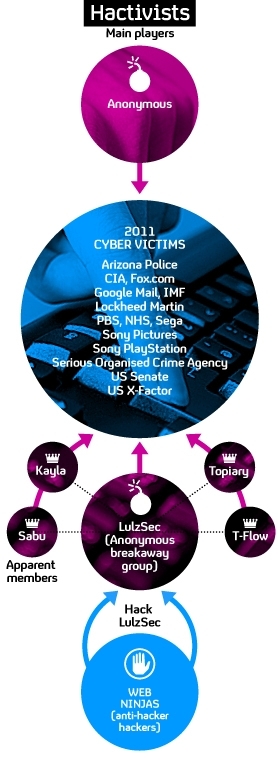Anonymous: ethical hackers or cyber-criminals?
Support for “hacktivist” group Anonymous is at an all-time high. But as Katie Razzall asks, is the group acting out of an anti-authority ethic or simply hacking for its own sake?
Once a threat confined to the margins of society, computer hackers have become a scourge of the modern age. Leading the charge is one group, Anonymous, launching online attacks on everything from scientology to credit card companies.
As its fame has grown, Anonymous members have increasingly felt the real-world consequences of their online activities
In the UK six major prosecutions are underway. Two of those accused, 19-year-old Ryan Cleary and 18-year-old Jake Davis, appeared in court last week, charged with alleged attacks on computer systems both here and in the US. Both are due to enter a plea in May.

The global nature of hackers’ targets makes policing difficult. The Netherlands have Europe’s highest levels of broadband access – not all of it used for legal purposes.
When hackers began attacking Dutch government websites, Dutch police were quick to act. One of those arrested was Martijn Gonlag – he is now doing community service after admitting helping to bring down the website of the Dutch prosecutor’s office
Once a loyal hacktivist, he now says Anonymous has gone too far by publishing individuals’ data online.
Worryingly for the police and governments worldwide, new figures show support for Anonymous has never been higher. Figures for the number of people downloading the group’s favoured hacking software peaked this month.
That is because governments in Europe and the US are considering a crackdown on internet piracy. The hackers are taking aim at websites supporting the proposals.
With its membership swelling, some researchers are concerned about how an anarchic movement like Anonymous will evolve, and who might start using its tactics.
Where hacktivism goes now is a battle being waged in the chatrooms and forums the hackers call home. And as more of us come to rely on the internet for basic services, the outcome has consequences for us all.
-
Latest news
-
NHS perinatal staff ‘exhausted, on their knees’, says maternity safety expert4m

-
Ex-Trump lawyer Michael Cohen testifies at hush money trial3m

-
Racial hate speech laws being ‘weaponised’ warns National Black Police Association7m

-
‘Hard to believe so many women going through such horrors’, says woman whose baby daughter was stillborn8m

-
Damning report condemns ‘shockingly poor’ UK maternity services12m

-




